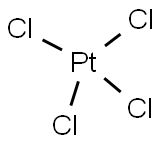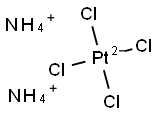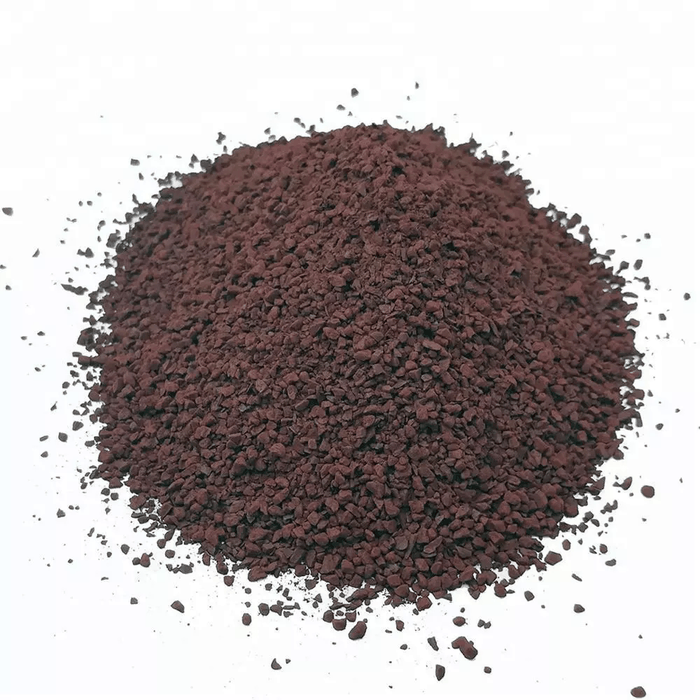Platinum dichloride
Synonym(s):Platinum dichloride;Platinum(II) chloride (73% Pt)
- CAS NO.:10025-65-7
- Empirical Formula: Cl2Pt
- Molecular Weight: 265.98
- MDL number: MFCD00011181
- EINECS: 233-034-1
- SAFETY DATA SHEET (SDS)
- Update Date: 2025-09-25 17:15:13

What is Platinum dichloride?
Chemical properties
Olive Green Crystals
The Uses of Platinum dichloride
Platinum chloride is a useful inorganic reagent which has been used in the preparation and characterization of Ru-Pt core-shell nanoparticles.
The Uses of Platinum dichloride
Platinum (II) chloride is a catalyst used for a variety of C-C bond, C-O bond, and C-N bond formation.
Definition
ChEBI: Platinum dichloride is a platinum coordination entity consisting of platinum(II) bound to two chlorine atoms. It has a role as a reagent and a catalyst.
Safety Profile
Moderately toxic by ingestion. A skin irritant. Human mutation data reported. When heated to decomposition it emits toxic fumes of Cl-. See also PLATINUM COMPOUNDS.
Purification Methods
It is purified by heating at 450o in a stream of Cl2 for 2hours. Some sublimation occurs because the PtCl2 sublimes completely at 560o as red (almost black) needles. This sublimate can be combined to the bulk chloride, and while still at ca 450o it should be transferred to a container and cooled in a desiccator. A probable impurity is PtCl4. To test for this add a few drops of H2O (in which PtCl4 is soluble) to the salt, filter and add an equal volume of saturated aqueous NH4Cl to the filtrate. If no precipitate is formed within 1minute, then the product is pure. If a precipitate appears, then the whole material should be washed with small volumes of H2O until the soluble PtCl4 is removed. The purified PtCl2 is partly dried by suction and then dried in a vacuum desiccator over P2O5. It is insoluble in H2O but soluble in HCl to form chloroplatinic acid (H2PtCl4) by disproportionation. [Cohen Inorg Synth VI 209 1960.]
Properties of Platinum dichloride
| Melting point: | 581 °C (dec.)(lit.) |
| Density | 6.05 g/mL at 25 °C |
| storage temp. | Store below +30°C. |
| solubility | insoluble in H2O, ethanol, ethyl ether; soluble in HCl |
| form | Powder |
| color | Green-brown |
| Specific Gravity | 6.05 |
| PH | 5-6 (H2O)suspension |
| Water Solubility | INSOLUBLE |
| Merck | 14,7528 |
| CAS DataBase Reference | 10025-65-7(CAS DataBase Reference) |
| EPA Substance Registry System | Platinium dichloride (10025-65-7) |
Safety information for Platinum dichloride
| Signal word | Danger |
| Pictogram(s) |
 Corrosion Corrosives GHS05  Health Hazard GHS08 |
| GHS Hazard Statements |
H314:Skin corrosion/irritation H317:Sensitisation, Skin H334:Sensitisation, respiratory |
| Precautionary Statement Codes |
P260:Do not breathe dust/fume/gas/mist/vapours/spray. P272:Contaminated work clothing should not be allowed out of the workplace. P280:Wear protective gloves/protective clothing/eye protection/face protection. P303+P361+P353:IF ON SKIN (or hair): Remove/Take off Immediately all contaminated clothing. Rinse SKIN with water/shower. P305+P351+P338:IF IN EYES: Rinse cautiously with water for several minutes. Remove contact lenses, if present and easy to do. Continuerinsing. |
Computed Descriptors for Platinum dichloride
Platinum dichloride manufacturer
New Products
Indole Methyl Resin tert-butyl 9-methoxy-3-azaspiro[5.5]undecane-3-carboxylate Boc-His(Boc)-OH 2-CTC Resin 4-Chloro-7-tosy1-7Hpyrrolo[2,3-d]pyrimidine 5,7-Dibromo-1H-indole 2,5-dichloro-N-hydroxy-4,6-dimethylpyridine-3-carboximidamide 2,2-Dimethoxy-7-azaspiro[3.5]nonane hydrochloride 4-chloromethyl-5-methyl-1,3-dioxol-2-one (DMDO-Cl) R-2-BENZYLOXY PROPIONIC ACID 1,1’-CARBONYLDIIMIDAZOLE 1,1’-CARBONYLDI (1,2-4 TRIAZOLE) N-METHYL INDAZOLE-3-CARBOXYLIC ACID 4-((2-hydroxyethyl)thio)benzoic acid 1-(TERT-BUTOXYCARBONYL)-2-PYRROLIDINONE Methyl 6-methylnicotinate 3-Pyridineacrylic acid tert-Butyl carbazate TETRAHYDRO-2H-PYRAN-3-OL 2-((4-morpholinophenylamino) (methylthio) methylene) malononitrile 3-(4-morpholinophenylamino)-5-amino-1H-pyrazole-4-carbonitrile 2,4-dihydroxybenzaldehyde 1,3-Diethyl-1,3-Diphenylurea Methyl 2-methylquinoline-6-carboxylateRelated products of tetrahydrofuran








You may like
-
 Platinum(II) chloride 99%View Details
Platinum(II) chloride 99%View Details -
 Platinum (II) chloride CAS 10025-65-7View Details
Platinum (II) chloride CAS 10025-65-7View Details
10025-65-7 -
 Platinum(II) chloride CAS 10025-65-7View Details
Platinum(II) chloride CAS 10025-65-7View Details
10025-65-7 -
 Platinum(II) chloride CAS 10025-65-7View Details
Platinum(II) chloride CAS 10025-65-7View Details
10025-65-7 -
 Platinum(II) Chloride CAS 10025-65-7View Details
Platinum(II) Chloride CAS 10025-65-7View Details
10025-65-7 -
 Platinum(II) chloride (about 73% Pt) CAS 10025-65-7View Details
Platinum(II) chloride (about 73% Pt) CAS 10025-65-7View Details
10025-65-7 -
 Platinum(II) chloride CAS 10025-65-7View Details
Platinum(II) chloride CAS 10025-65-7View Details
10025-65-7 -
 Platinum (II) Chloride, Grade Standard: Reagent GradeView Details
Platinum (II) Chloride, Grade Standard: Reagent GradeView Details
10025-65-7
